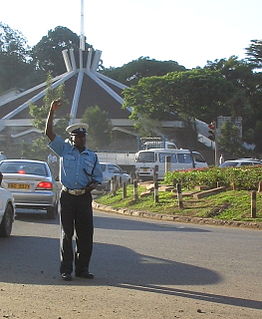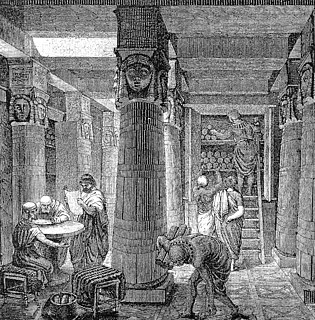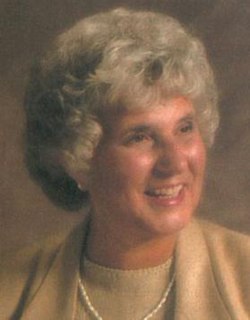Related Research Articles

A library is a curated collection of sources of information and similar resources, selected by experts and made accessible to a defined community for reference or borrowing, often in a quiet environment conducive to study. It provides physical or digital access to material, and may be a physical location or a virtual space, or both. A library's collection can include books, periodicals, newspapers, manuscripts, films, maps, prints, documents, microform, CDs, cassettes, videotapes, DVDs, Blu-ray Discs, e-books, audiobooks, databases, table games, video games and other formats. Libraries range widely in size up to millions of items. The word for "library" in many modern languages is derived from Ancient Greek βιβλιοθήκη (bibliothēkē), originally meaning bookcase, via Latin bibliotheca.

Kenyatta University (KU) is a public research university with its main campus in Nairobi County, Kenya. It acquired the status of university in 1985, being the third university after University of Nairobi (1970) and Moi University (1984). As of October 2014, it was one of 23 public universities in the country.
Education in Kenya refers to the education system in Kenya.
An information professional or information specialist is someone who collects, records, organises, stores, preserves, retrieves, and disseminates printed or digital information.

Lamu County is located in the Northern Coast of Kenya and is one of the Six Coastal Counties in Kenya. It borders Tana River County in the southwest, Garissa County to the north, Republic of Somalia to the northeast and the Indian Ocean to the South. It lies 1° 40’ and 2° 30’south and longitude 40° 15’ and 40° 38’south. The county has a land surface of 6,273.1 km that include the mainland and over 65 islands that form the Lamu Archipelago. The total length of the coastline is 130 km while land water mass area stands at 308 km.

The United Nations Office at Nairobi (UNON) is one of four major United Nations office sites where numerous different UN agencies have a joint presence. Established in 1996, it is the UN's headquarters in Africa.

The Institute of Museum and Library Services (IMLS) is an independent agency of the United States federal government established in 1996. It is the main source of federal support for libraries and museums within the United States, having the mission to "create strong libraries and museums that connect people with information and ideas." IMLS "works at the national level and in coordination with state and local organizations to sustain heritage, culture, and knowledge; enhance learning and innovation; and support professional development." Their vision is "a democratic society where communities and individuals thrive with broad public access to knowledge, cultural heritage, and lifelong learning." In fiscal year 2015, IMLS had a budget of $228 million.

Kenya's National Police Service (NPS) is the umbrella law enforcement organ in Kenya. The service was established in 2011 under Article 243 of the Constitution of Kenya, following dissolution of Kenya Police Force and Administration Police Force.
The National Library and Information System of Trinidad and Tobago is a corporate body established by the NALIS Act No. 18 of 1998 to administer the development and coordination of library and information services in Trinidad and Tobago.
The Kenya National Library Service (KNLS) is a corporate body of the Kenyan government with a mandate to "promote, establish, equip, manage, maintain and develop libraries in Kenya". It was established in 1965 by an Act of Parliament of the Laws of Kenya to provide library and information services to the Kenyan public. In its service provision, KNLS plays a dual role of public library and national library of Kenya. The public library services are available in their 61 branches throughout Kenya, while the national library services are available at the headquarters in Nairobi.
The Baháʼí Faith in Kenya began with three individuals. First, Richard St. Barbe Baker took a constructive engagement with the indigenous religion of Kenyans to a United Kingdom conference on religions, where, in sympathy with his efforts, he was presented with the Baháʼí Faith and became a convert. The second individual was Enoch Olinga who traveled to Kenya when he served in the British Royal Army Educational Corps. The third came twenty-one years after the first and marked the arrival of the Baháʼí Faith in Kenya. In 1945 Mrs. Marguerite Preston arrived in Kenya. She had been a member of the National Spiritual Assembly of the United Kingdom from 1939 through 1945 when she married a Kenyan tea grower and moved to Kenya where the couple had three children within two years and she was the only Baháʼí in the nation. The Association of Religion Data Archives estimated about 429,000 Baháʼís in Kenya in 2005.

Peggy Sullivan was an American librarian and educator. She was elected president of the American Library Association and was a scholar of the history of librarianship.

Library science is an interdisciplinary or multidisciplinary field that applies the practices, perspectives, and tools of management, information technology, education, and other areas to libraries; the collection, organization, preservation, and dissemination of information resources; and the political economy of information. Martin Schrettinger, a Bavarian librarian, coined the discipline within his work (1808–1828) Versuch eines vollständigen Lehrbuchs der Bibliothek-Wissenschaft oder Anleitung zur vollkommenen Geschäftsführung eines Bibliothekars. Rather than classifying information based on nature-oriented elements, as was previously done in his Bavarian library, Schrettinger organized books in alphabetical order. The first American school for library science was founded by Melvil Dewey at Columbia University in 1887.

Foster Edward Mohrhardt was a United States librarian. He had a long and illustrious career in library and information science as a scholar, organizer and diplomat, and was listed by American Libraries among "100 Leaders we had in the 20th Century". Mohrhardt is also known for his work to have the United States Department of Agriculture Library re-designated as a national library.

Water supply and sanitation in Kenya is characterised by low levels of access to water and sanitation, in particular in urban slums and in rural areas, as well as poor service quality in the form of intermittent water supply. Seasonal and regional water scarcity exacerbates the difficulty to improve water supply.

Ralph W. Munn was an eminent figure in the field of American and international library and information science. Recognized by the journal American Libraries as one of "100 of the most important leaders we had in the 20th century", and described as an "administrator, educator, and author ... known for his fairness, clarity, and grace", he was also widely known within the profession as "the father of the modern library movement in Australia and New Zealand".

Margaret Elizabeth Chisholm was an American librarian and educator and served as President of the American Library Association from 1987 to 1988. She promoted librarians as skilled in information technology.

Jacinta Were is a Kenyan librarian. Were has specialised in the management of electronic libraries over the 30 years of her career in librarianship.
References
- 1 2 3 4 Wilhite, Jeffrey M., Todd J. Kosmerick and Laurie Scrivener (2000). International Biographical Directory Of National Archivists, Documentalists, and Librarians. 2nd ed. The Scarecrow Press Inc., Lanham, MD.
- 1 2 3 Mwiyeriwa, Steve S. (2001). “Stanley Kamanga Nganga”. Library Association Record. 103:10
| | This Kenyan biographical article is a stub. You can help Wikipedia by expanding it. |